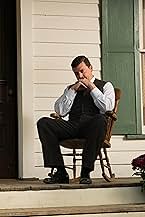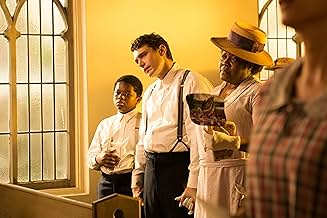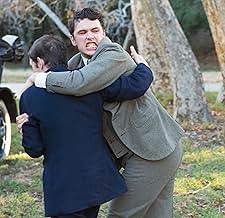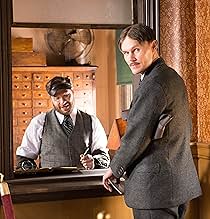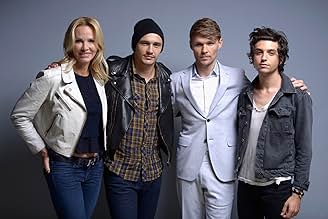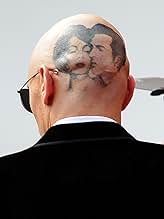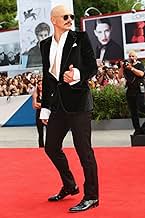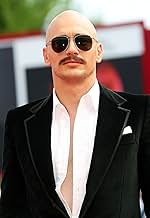IMDb RATING
4.9/10
1.3K
YOUR RATING
A look at the trials and tribulations of the Compson family, living in the Deep South during the early 20th century.A look at the trials and tribulations of the Compson family, living in the Deep South during the early 20th century.A look at the trials and tribulations of the Compson family, living in the Deep South during the early 20th century.
- Director
- Writers
- All cast & crew
- Production, box office & more at IMDbPro
Featured reviews
I've never been able to make it through this Faulkner novel, but anyone who is able to cipher through the notoriously confusing The Sound and the Fury and write a coherent screenplay should be congratulated. I think the only reason this movie was panned was because it was James Franco's baby, and very few of his movies were well-liked by the critics. Had someone else put his name on the film, directed it and starred as the mentally retarded Benji, the film probably would have been touted and given dozens of nominations throughout the awards season. Instead, it was criticized as being a failure and given the terrible insult of "it's hard to fault him for trying."
This heavy, upsetting drama follows a Southern family in the 1920s; crowned by patriarch Tim Blake Nelson, the four siblings have immense problems and struggle to face their existence. Split into four sections, each section is filmed with a different touch and tone. Experimenting with light, framing, and point of view, each segment clearly describes what the different characters are going through and how they look at life. Had anyone else directed this movie, with the same result, I really believe the talent behind the camera would have been praised.
The first section is from James Franco's point of view, so everything is handheld, wild, and confused. One image leads to a memory, which leads to another memory, and when brought back to the present moment, both Franco and the audience are briefly disoriented. Franco's character is mentally retarded, and as simple pleasures calm him down momentarily, the slightest upset can change his mood. He loves his sister, who was the only one to defend him when they were little, but his obsession with finding reminders of her gets him into trouble. He's always assigned a guardian to walk with him and try to manage his moods, but since his "keepers" begrudge the duty and treat him terribly, he absorbs their negative energy. He can hear conversations about sending him away to an asylum, he can tell when people are insulting him, and on some level, he knows he's unable to express himself or communicate better than an animal.
The second section shows Jacob Loeb's troubles as he deals with his immense emotional problems, as well as his incestuous relationship with his sister. It doesn't seem possible for anything to be more disturbing than the first segment, but watching people with mental problems who don't have Franco's excuse is really disturbing. The third section cements the pattern: Ahna O'Reilly has a profound and damaging impact on all three of her brothers' lives. Both Franco and Loeb get into permanent trouble as they seek different versions of her love, and Scott Haze is left to pick up the pieces of her irresponsible mistake. She leaves behind an illegitimate child and Scott has to put his entire life on hold while he raises his niece. He's supposed to be a villain, but as the best villains can make the audience understand them, his frustration is completely relatable. He's left cleaning up everyone else's messes, and he's forced to watch history repeat itself with the next generation. He becomes the new patriarch, patronizing his mother and putting up with his brother, and the young daughter of the family gets into trouble and disrespects propriety and family order. When he loses his temper with Joey King's rebellious behavior, you feel like joining him. Everything gets wrapped up with a brief fourth section following Loretta Devine, a family servant who has known the siblings since childhood. I'm sure I'm not alone in wishing this segment was longer, since Loretta's such a pro and isn't given as much screen time to show her talent, but with the heavy subject matter of the past ninety minutes, it's understandable that the movie took pity on its audience and ended quickly.
The performances in The Sound and the Fury are mind-blowing. You know the feeling you get when you see a stage play with incredible actors who bounce emotions off each other so perfectly there's a tangible hum in the air? You'll get the same feeling when you watch this movie. Each cast member seems so set in his or her role, it'll be nearly impossible to see them in other movies and believe they can play other characters. Not a single emotion of James Franco's wordless performance hints to the audience, "Look how great an actor I am!" He's not pretending to be mentally retarded and completely out of touch with his surroundings; he actually is. If you've never seen in his earlier heartthrob films, you won't really be able to appreciate the depth of his transformation. And if anyone else had given that performance, he probably would have gotten an Oscar nomination out of it. If you can get yourself in the mood for a heavy Southern drama that makes Tennessee Williams's plays seem like screwball comedies, rent James Franco's highly underrated The Sound and the Fury.
DLM Warning: If you suffer from vertigo or dizzy spells, like my mom does, this movie might not be your friend. The entire first section and a couple of scenes in the second section are filmed with a handheld camera, and that will make you sick. In other words, "Don't Look, Mom!"
Kiddy Warning: Obviously, you have control over your own children. However, due to sexual content, I wouldn't let my kids watch it.
This heavy, upsetting drama follows a Southern family in the 1920s; crowned by patriarch Tim Blake Nelson, the four siblings have immense problems and struggle to face their existence. Split into four sections, each section is filmed with a different touch and tone. Experimenting with light, framing, and point of view, each segment clearly describes what the different characters are going through and how they look at life. Had anyone else directed this movie, with the same result, I really believe the talent behind the camera would have been praised.
The first section is from James Franco's point of view, so everything is handheld, wild, and confused. One image leads to a memory, which leads to another memory, and when brought back to the present moment, both Franco and the audience are briefly disoriented. Franco's character is mentally retarded, and as simple pleasures calm him down momentarily, the slightest upset can change his mood. He loves his sister, who was the only one to defend him when they were little, but his obsession with finding reminders of her gets him into trouble. He's always assigned a guardian to walk with him and try to manage his moods, but since his "keepers" begrudge the duty and treat him terribly, he absorbs their negative energy. He can hear conversations about sending him away to an asylum, he can tell when people are insulting him, and on some level, he knows he's unable to express himself or communicate better than an animal.
The second section shows Jacob Loeb's troubles as he deals with his immense emotional problems, as well as his incestuous relationship with his sister. It doesn't seem possible for anything to be more disturbing than the first segment, but watching people with mental problems who don't have Franco's excuse is really disturbing. The third section cements the pattern: Ahna O'Reilly has a profound and damaging impact on all three of her brothers' lives. Both Franco and Loeb get into permanent trouble as they seek different versions of her love, and Scott Haze is left to pick up the pieces of her irresponsible mistake. She leaves behind an illegitimate child and Scott has to put his entire life on hold while he raises his niece. He's supposed to be a villain, but as the best villains can make the audience understand them, his frustration is completely relatable. He's left cleaning up everyone else's messes, and he's forced to watch history repeat itself with the next generation. He becomes the new patriarch, patronizing his mother and putting up with his brother, and the young daughter of the family gets into trouble and disrespects propriety and family order. When he loses his temper with Joey King's rebellious behavior, you feel like joining him. Everything gets wrapped up with a brief fourth section following Loretta Devine, a family servant who has known the siblings since childhood. I'm sure I'm not alone in wishing this segment was longer, since Loretta's such a pro and isn't given as much screen time to show her talent, but with the heavy subject matter of the past ninety minutes, it's understandable that the movie took pity on its audience and ended quickly.
The performances in The Sound and the Fury are mind-blowing. You know the feeling you get when you see a stage play with incredible actors who bounce emotions off each other so perfectly there's a tangible hum in the air? You'll get the same feeling when you watch this movie. Each cast member seems so set in his or her role, it'll be nearly impossible to see them in other movies and believe they can play other characters. Not a single emotion of James Franco's wordless performance hints to the audience, "Look how great an actor I am!" He's not pretending to be mentally retarded and completely out of touch with his surroundings; he actually is. If you've never seen in his earlier heartthrob films, you won't really be able to appreciate the depth of his transformation. And if anyone else had given that performance, he probably would have gotten an Oscar nomination out of it. If you can get yourself in the mood for a heavy Southern drama that makes Tennessee Williams's plays seem like screwball comedies, rent James Franco's highly underrated The Sound and the Fury.
DLM Warning: If you suffer from vertigo or dizzy spells, like my mom does, this movie might not be your friend. The entire first section and a couple of scenes in the second section are filmed with a handheld camera, and that will make you sick. In other words, "Don't Look, Mom!"
Kiddy Warning: Obviously, you have control over your own children. However, due to sexual content, I wouldn't let my kids watch it.
I might change my mind at some point, but ever since seeing this film I've been asking myself what, if anything, James Franco could have improved with this difficult adaptation of a difficult book, and I haven't thought of anything yet. The real question is whether a film-maker ought to revise the source material to make it easier for the public to understand. Yes, he should, is the answer if all that matters is the commercial viability of the film. No, he shouldn't, if he's creating a work of art, and that what Franco has done here. I didn't think he had it in him. If you've read the book a few times, enough to disentangle the narrative, you'll appreciate what's been done. The book is divided into three parts. Part 1 focuses on Benjy and his experiences. Because Benjy has no grasp of time, past and present are mixed up confusingly. One lovely touch in the film is the way that random thoughts of Benjy are heard in his sister's voice, because he has no voice of his own. Part 2 is the story of his mentally disturbed brother Quentin. In the film, as in the book, it helps to know that there are two Quentins. The other one is Benjy's sister Caddy's daughter. In the book, Quentin's story is interrupted by partially informative streams of consciousness. In the film, the conclusion you reach is that here is a deeply disturbed young man, just about able to pass himself off as 'normal'. Again, the flow of time is as disordered as the man. Part 3 is, finally, a coherent narrative structure, focusing on brother Jason, the man with the worst anger management problem in the world. The film has matched all three parts as well as a film possibly could, and if you hate it, as my partner did, then you'd probably hate the book, and I could understand why. But I have to say that James Franco has created one of the best-made films I've seen recently, and I admire him greatly for doing so. It makes me optimistic about the forthcoming 'In Dubious Battle'.
I watched this on netflix, expecting it to be ridiculous. It turned out to be a credit to Franco's seriousness and ambition. The tone was right, the pacing was right, the visual language was right, and I thought three of the principle characterizations were fantastic (Jason III, Quentin the son, and Jason IV). Actually I liked the Dalton Ames and Cady and Luster. And the Mother too. Anyway, I accepted from the beginning that a movie adaptation of TSTF is a huge challenge - it's a book I know pretty well, and I imagine anyone who sees this movie without having read TSTF a few times would wonder WTF?
So hats off to James Franco. He's such a hottie that I don't think people give him credit for serious work. Here's it's deserved.
This movie was a complete waste of time. This movie keeps on repeating itself throughout its entirety. He should whether he believes in god or not pray for forgiveness for this piece of garbage. If I had to hear "She smells like the trees." or some crap like that one last time I would have went full mental just like Franco did in the movie.
Filming ordinary books is easy; it's the stuff of the film business. Filming one of the greatest English language novels of the 20th century is really hard. Really hard.
The script is a worthy and very creditable effort which makes concessions to film and audience comprehensions; something Faulkner flouted when he forced readers to deal with the opening sixty pages of this remarkable book.
The telling is true enough, it keeps to the thread of the stories; the compromises between book and film are understandable; the portrayals are strong and the director has Faulkner's echo to work with. It is a solid entry to the book and no doubt it will be the thing students use instead of reading it.
The question is whether it works in its own right and that is more problematic because if one comes to the film via the book the comparisons are interminable. If a viewer sees it as is they could quibble with its purpose and narrative, still atypical, especially in these conventional times.
The essential quality of Faulkner's prose is effaced; it has to be as the camera replaces the text, and that is a huge loss for multifarious reasons, in particular the extreme subjectivity which must be diluted through the objective lens.
Even so, the film is admirable for its talent and effort; nor does it waste the viewer's attention.
The script is a worthy and very creditable effort which makes concessions to film and audience comprehensions; something Faulkner flouted when he forced readers to deal with the opening sixty pages of this remarkable book.
The telling is true enough, it keeps to the thread of the stories; the compromises between book and film are understandable; the portrayals are strong and the director has Faulkner's echo to work with. It is a solid entry to the book and no doubt it will be the thing students use instead of reading it.
The question is whether it works in its own right and that is more problematic because if one comes to the film via the book the comparisons are interminable. If a viewer sees it as is they could quibble with its purpose and narrative, still atypical, especially in these conventional times.
The essential quality of Faulkner's prose is effaced; it has to be as the camera replaces the text, and that is a huge loss for multifarious reasons, in particular the extreme subjectivity which must be diluted through the objective lens.
Even so, the film is admirable for its talent and effort; nor does it waste the viewer's attention.
Did you know
- TriviaJames Franco and Seth Rogen also appeared together in Freaks & Geeks (1999), En cloque, mode d'emploi (2007), Délire Express (2008), The Green Hornet (2011), C'est la fin (2013), L'Interview qui tue ! (2014), The Night Before: Secret Party (2015), Sausage Party : La Vie privée des aliments (2016), The Disaster Artist (2017), and Zeroville (2019).
- ConnectionsReferenced in Showreel: Ol' MacDonald Had a Show (2013)
- How long is The Sound and the Fury?Powered by Alexa
Details
- Runtime1 hour 41 minutes
- Color
- Aspect ratio
- 16:9 HD
Contribute to this page
Suggest an edit or add missing content

Top Gap
By what name was The Sound and the Fury (2014) officially released in India in English?
Answer

